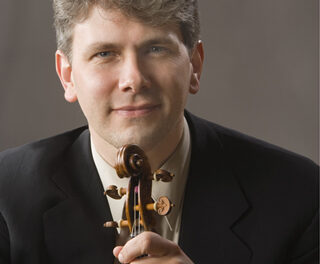Sixteen voices proclaimed in the hall: “There arose a war.”
Bach Akademie Charlotte presented Es erhub sich ein Streit, S.19, one of J. S. Bach‘s cantatas for the Feast of St. Michael, on June 10. at Myers Park United Methodist Church. This cantata, powerful in both lyrics and music (as well as in execution), was the fourth of the nine-program festival and the first of a two-part series called The Bach Experience.
Bach doesn’t hesitate an entrance in Es erhub sich ein Streit; the chorus starts singing on the first beat, with no instrumental cadence or introduction. With accents and polyphonous sixteenth notes, the audience is thrust into the battle between Archangel Michael and Satan. Without context or preparation, we are taken by surprise, and our attention is immediately captivated.
But sometimes preparation is nice, and that is why Scott Allen Jarrett, conductor and artsitic director of Bach Akademie Charlotte, created The Bach Experience, to educate audiences about Bach, Bach’s music in general, and then about a particular piece that the then audience hears.
Jarrett opened the afternoon with an engaging, hour-long presentation introducing the cantata and providing context. Aided by the casual setting of the church’s Jubilee Hall, this gave the program a workshop feel in delivering an enthusiastic invitation into the world of Bach and an opportunity to really understand the prolific composer and his music.
Jarrett introduced us to the particular oeuvre to which this cantata belongs: Bach was commissioned to compose works for St. Thomas Lutheran Church in Leipzig, Germany in the mid-1700s. It was in this period that he created most of his choral works, including the cantatas for the Feast of St. Michael, featured in The Bach Experience I & II. According to Jarrett, Bach essentially was tasked with writing the Sunday sermon. The pieces needed to include the day’s scripture readings and relation to the churchgoer and its universal, timeless meaning, the significance from “the corporate to the personal,” as Jarrett put it. Jarrett went over how all of this is expressed specifically in Es erhub sich ein Streit, both in the libretto and music.
In sermon style, Bach starts out with the reading of the day. Lyric-wise, in this cantata, he set a libretto by his frequent collaborator, the poet known as Picander, who used direct translations from Revelation 12: 7-12, the reading from the Feast of St. Michael. For example, the first line of the reading states that “There arose a war in Heaven.” Musically, Bach mimics this same scripture, thrusting the listener into the war with fast-moving voices that sound almost chaotic, just like a battle.
In the arias and recitatives that follow (sung beautifully by soloists from the Vocal Fellows program: Chelsea Helm, soprano; Molly McGuire, mezzo-soprano; Aaron Cates, tenor; and Harrison Hintzsche, baritone), the libretto reflects more of the sermon, moving from the corporate to personal to include prayer and personal meditation. In the second-to-last recitative, sung softly and mournfully by Cates, the libretto asks, “What is vile man, that child of earth?/ A worm, a wretched sinner.” Musically, Bach mimics this with a band (North Carolina Baroque Orchestra, though Jarrett says the word “orchestra” is technically inappropriate to this time) which swells and pauses, almost as if sobbing, ashamed. Or perhaps the breaths and crying are in overwhelming gratitude, for Cates then sang clearly, “See, how even the Lord comes to love him so.”
Moments like these, with solos sung vulnerably, were very touching; others, like the opening and ending with a full chorus, were exciting. Some parts were perhaps even scary. In the opening Chorus, the sopranos sing a creepy descending chromatic, meditating on the word “cruel” to “Satan’s cruel might” (another nuance Jarrett pointed out). Bach doesn’t just inform the churchgoer of the day’s reading and lesson by providing a soundtrack for the libretto, his music also teaches what the lesson is truly about. He allows the audience to experience these varying emotions, which then allow us to latch onto the concepts in a personal way. As we experience them, they become a part of us. Imagine if Bach were writing sermons today for every Sunday (or Saturday, or Friday) service! How much smarter (and more compassionate) we all would be!
And that’s Jarrett’s point. He stated at the beginning that this cantata was written for one day in 1726, for one specific group of people, and that even Bach would probably be confused as to why the cantata would be performed today. But Bach makes us smarter. In this cantata, he provides us a lesson both “corporate and personal,: one that is exciting and dramatic as well as reflective and touching. He gives a lesson through music, with the help of The Word, which then becomes ever relevant.
Musicians and vocalists of Bach Akademie Charlotte successfully captured Bach’s lesson, and Jarrett’s lesson further enriched the already rich experience. Historical and Biblical context provided for deeper understanding of this particular piece’s narrative, and the musical nuances he pointed out in speaking and with musicians in performance furthered the audience’s appreciation of the work.
Where else would one get this kind of information or experience? Charlotte is lucky to have Bach Akademie Charlotte returning for its second of what will hopefully be many years to come. Bach Akademie Charlotte’s festival continues through June 15. To most easily view a listing of these events, type “Bach Akademie Charlotte” into CVNC‘s search bar.











